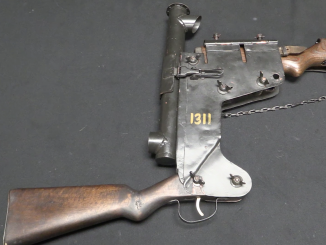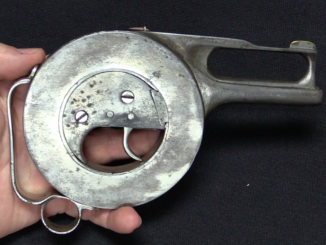Larry Vickers has published the newest book in the Vickers Guide series, and it looks at German small arms of World War II – the first of two volumes to do so. I had a hand in the project writing a substantial chunk of the text, and so I met up with Larry to sign copies of the book. And since we were in the same room together, what better to do than a Q&A? These questions, as always, were provided by my wonderful group of supporters at Patreon…
1:02 – Any guns you regret selling?
2:08 – Condensed bio
5:13 – Is the DI system in the AR good or bad?
8:03 – What was Larry’s involvement in the HK 416?
9:04 – Why is the AK so good?
11:16 – 7.62×39 or 5.45×39?
12:39 – What gun do you want to add to your personal collection?
13:31 – Why is the AR guy (Vickers) doing a book on German WWII guns?
15:00 – Was the massive German R&D in WWII good or bad for them?
17:22 – If you were in WWII, what rifle and what job would you want?
19:40 – Thoughts on the Stoner 63
22:26 – As a lefty, how do you shoot bolt action rifles?
24:18 – What is the most interesting piece of firearms history development?
25:28 – What handgun would you have picked for the new Army handgun?
27:56 – Before the M4, what rifles/carbines did elite units use?
31:48 – Plans for another 1911 build class?
33:42 – Why were the Germans unique in developing a GPMG?
36:44 – Why does H&K hate 10mm?
39:38 – Preference for Inglis vs FN High Power?




Historical point- there were far more real special operations in WW 2 than today if you use the definition of “special” being operations that the main force can’t do without significant training on special tactics or equipment or requiring special language ability. Many WW 2 missions failed and many were unnecessary. After WW 2 the CIA continued with true special operations- parachuting guerillas into the USSR and China- and 100% were utter failures.
If you want to catch a bad guy at his home in Afghanistan in 2007 and you send SOF instead of the 101 st Abn because “they’re better” that’s not a special operation. Bin Laden is a good example of a mission that could have been assigned a USMC rifle platoon. That’s using SOF as slightly better infantry. If you parachute a Jedburgh team into France in 1944 and the members must be able to pass for Frenchmen or at least be fluent in French, hide out from the Germans, and operate Morse while sabotaging railways that’s a special operation.
The need for SOF has never been less. Much of the Special Recon, direct action or sabotage missions a WW 2 SOF unit might be sent to do can now be done by various intelligence technologies, cyber attack or PGMs. For direct action the conventional army has had a lot of CQB practice and experience with explosive entry etc and is equipped with tech (i.e GPS, encrypted radio) that makes skills such as celestial navigation and Morse Code (i.e SAS and LRDG in North Africa) unnecessary. Politics may require a special unit for hostage rescue (HR) but except for very unusual situations- passenger airliners and ships- the current SOF HR capability is excessive.
The primary function of modern SOF- except for the very limited need for scuba and mini-subs etc now have little to do with conducting a truly “special operation” and more to do with morale building, retention and recruiting. The military needs to get good people to join and the chance to be “special” is a major enticement to go into the infantry.
Some people got it as far back as WW2;
A friend of mine was once part of an Army unit that, during TDY in ROK in 1986-87, was selected to play OPFOR for a joint exercise.
They infiltrated a Ranger encampment, and at zero hour essentially terminated every officer, blew up the ammo and fuel stores, and RPG’d the barracks tents for good measure (administratively, of course).
The refs were very surprised, as they’d been expected to lose.
Oh, his unit? 9th Infantry Division, Chemical Recon, Fort Lewis, WA.
😉
cheers
eon
Term “special operations” and similar are used a lot. I believe it is to add laurels to otherwise mundane service; military service is (and those who were there know it) – boring and lots of wasted lifetime which can be spent more productively elsewhere.
However, back to “special operations”. My understanding that in conflict of epic proportions (such as was WWII) all involved are “special operations”, especially those in rear areas. This is due to mobile nature of warfare, who’s prospects ae steadily increasing due to technical capabilities. For one, large emphasis in military doctrine of RF in air-mobility. There would be “front everywhere” sort of thing.
In context Great Patriotic War разведчики (reconnaissancers).
There is Фронтовые разведчики. «Я ходил за линию фронта» book by Артем Драбкин, which can be bought (in e-book form here):
https://www.litres.ru/artem-drabkin/frontovye-razvedchiki-ya-hodil-za-liniu-fronta-2/
fragment can be read here:
http://www.rumvi.com/products/ebook/фронтовые-разведчики-я-ходил-за-линию-фронта-/2cb3d4a0-7de0-41aa-baee-44be43a22d0b/preview/preview.html
In Russian there is «Я пошел бы с ним в разведку» phrase, which originated back then. This book contain memoirs/interviews with разведчики without “cleaning” and theirs task required use of knives and hands rather than guns, so you could guess what we silently disposed guard mean…
Good remainder Daweo
as matter of fact, soviet ‘dessant’ was dropped several times in territory of “Bohmen u. Mehren” (protectorate). Those were officers who lead resistance groups and later assisted Red Army in her advance. Many of them paid the high price. In sense of objectivity, we should pay our respect.
«Я пошел бы с ним в разведку»
——————
I like that one; will remember it. To trust someone that much certainly means a lot.
“I like that one; will remember it.”
Then check also Батальонная Разведка song:
https://www.youtube.com/watch?v=bF2K6uOaO4o
text: http://shanson-text.ru/song.php?id_song=4665
Went thru couple excerpts, they speak about weapons they used… German SMGs(MP38?) were lighter, but sometimes not reliable (capricious?)… maybe because their handling was different. Also 9mm ammunition was not available in quantity. Russian ones (presume PPSh41) were “reliable under all circumstances”. Otherwise they liked German pistols and used their own knives. Hand grenades (they call them “lemons” term which I encountered before) were also common.
One interesting detail: when comes to camouflage or enemy attire, pictures do not suggest any of that. I bet they must have used some method of cover not to draw attention. There are pictures with captured German soldiers; I do not see any degrading treatment in them. Of course what followed we do not know.
“they call them “lemons” term which I encountered before”
You mean Лимонка? In regard to grenade name, it is used for Ф-1
https://en.wikipedia.org/wiki/F1_grenade_(Russia)
not for every grenade, similar to U.S. PINEAPPLE grenade which is for Mk II grenade
Which company? Much more relevant than some massive “division”.
This interview/ dialog is something I did not expect on FW and it is, in a way, a “holiday treat” for us all. Mr. Vickers is certainly one of firearms stalwarts. Also, we may take Ian for granted, but he too is personality of growing fame and respect.
Now little bit of weird swing of thought, if I may. Talking guns and having proficiency with them in good and admirable, as with anything else. But how many of us can say how it feel to be on receiving side; having taken a bullet and survived. I think that would complete the circle. Military guns are, after all about mutual exchange of bullets, are they not?
To this ties my physical impression of Mr. Vickers; he is a beefcake without doubt. I certainly believe and appreciate what he says about his service record… impressive. However, being of that kind of stature, is it not a liability? I recall, after many years, seeing first time Soviet soldiers (just before friendly visit they paid to us in 68); they were skinny, very skinny and on top of it attired in very loose old style fatigues. My thought was: how I would one be able to get this guy at 100m. Very hard, even if he was static. With beefy guy like that, I do not know…. about his survival prospect although he may tell me that he was much skinnier during his service. Many U.S. military personnel are not, though.
In any case, this was excellent talk and probably close to ‘gun Olympus’, we can expect to see.
The Germans did indeed hedge their bets and issue a magazine for the MG34 — and that 75-round saddle drum beat all competitors for capacity, from Bren and Chatellerault through Lewis to ZB. The 34 really tried to be an all-purpose MG with different degrees of portability, though the magazine just turned out to be more trouble and expense than it was worth, and thus the various belt-box holders and ultimately the MG42. What is the current FN product that can fire from a belt or STANAG magazines with barely any adjustment? More hedging of bets. I hope the book sells well.
“7.62×39 or 5.45×39”
When asking this, always keep in mind that:
– Soviet Union in 2nd half of 1940s considered multiple options for new intermediate cartridge, varying in case shape, bullet mass, muzzle velocity and so on, but only 2 bullet diameters were finally choiced: 7,62 mm and 6,75 mm
– ballistic superiority quality of 6,75 mm was noted, however this size was abandoned because incediary and tracer would be less effective, additionally then (1940s) still were problem of incediary and tracer for intermediate 7,62 mm bullet present problem
– point above was of paramount importance as Soviets planned “triple-usage” for that cartridge (SKS, AK and RPD)
– if you do not need have “triple-usage” requirement point above does not hold, additionally if you do not plan use incediary or tracer, point 2 dashes earlier does not hold
More data about 7.62×39 competitors: http://otvaga2004.ru/kaleydoskop/kaleydoskop-ammo/glavnyj-kalibr/
Ref the Glock 20, one military does issue it. Danish military for there Sirius patrols in Greenland (for exactly the same reason as stated; bears)
I like the dear information and facts a person present on your articles. I most certainly will save your site look all over again in this article typically.. Outdoor Fitness Equipment , Open Gym Equipment , Fitness Equipment I am just somewhat certain I’ll understand a good amount of brand-new things right right here! All the best for an additional!